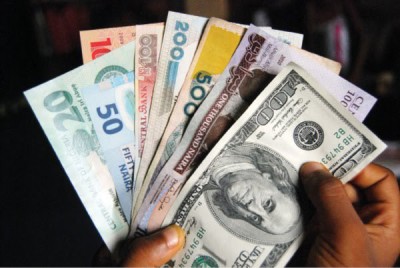
Suddenly, the possibility of a more than 20 percent slump in Nigeria’s currency is off the cards, for now at least.
Traders on Tuesday lowered their expectations on the size of a naira devaluation as central bank Governor Godwin Emefiele stuck to his policy of keeping a stable exchange rate.
Three-month naira forwards strengthened the most on record against the dollar after Emefiele gave no indication in a Monetary Policy Committee statement released on Tuesday that he’s ready to ease controls on the currency. Crude prices at 12-year lows of about $30 a barrel, an unprecedented government spending plan and black-market rates close to records have been heaping pressure on authorities to scrap the country’s almost one-year limits on naira trading and allow the currency to depreciate.
“It seems like although there’s been a lot of criticism of this it really hasn’t gotten through to the governor,” John Ashbourne, a London-based Africa economist at Capital Economics Ltd., said by phone. “Some of the wording was a bit worrying. When he talks about his unyielding support for the current policies and so on. That’s quite bad news.”
Emefiele offered no hint that he is ready to ease currency-trading and import restrictions that have kept the interbank exchange rate fixed at 197-199 per dollar since March, even though they have been widely panned by investors and businesses alike and questioned by lawmakers. The black-market rate has plunged as foreign currency has become scarce, hitting a record low of 306 per dollar before the announcement on Tuesday, according to Everdon Bureau de Change, a Lagos-based money changer.
Market Reaction
Three-month non-deliverable contracts rallied a record 8.7 percent to 229.5 per dollar on Tuesday. They rose a further 2.9 percent to 223 by 9:36 a.m. in Lagos on Wednesday, the highest level since Dec. 22. That means investors now see a depreciation of about 12 percent in that period, after predicting a weakening of 21 percent before Tuesday’s announcement. One-year forwards strengthened to 275.50, from 287 before Emefiele spoke.
Forwards fell on Dec. 22 after President Muhammadu Buhari, who has backed Emefiele’s policies, hinted in his 2016 budget speech that he would accept a devaluationand said that the central bank would introduce “some flexibility” to its exchange-rate policy. Three-month contracts were as strong as 208.38 in early December.
Nigeria’s All Share Index, which closed before Emefiele’s announcement, fell 0.6 percent on Tuesday to 23,832.03, ending four days of gains. The benchmark gauge has fallen 17 percent this year, the fourth-most among 93 primary gauges tracked by Bloomberg, as foreign investors have fled to avoid a devaluation they see as all but inevitable.
Negative Impact
The currency controls are “having a very negative impact on trade and economic growth,” Joseph Rohm, who helps manage $900 million in sub-Saharan African equities outside South Africa for Cape Town-based Investec Asset Management, said by phone Tuesday. His company has reduced its exposure to Nigeria in the past 18 months. “I’m expecting the equity market to be very weak tomorrow and over the coming days. I think they’ll continue to defend the naira for longer, maybe in the hope that oil prices rise.”
Nigeria’s economic growth rate dropped to 3 percent last year, the slowest pace since 1999, according to the International Monetary Fund. The country is Africa’s largest economy and biggest oil producer.
The government’s plans to raise up to $1 billion of Eurobonds to help plug its budget deficit may be hindered by its foreign-exchange regime, according to Alan Cameron, an economist at Exotix Partners LLP. Nigerian officials will soon go on a non-deal roadshow to meet investors, Finance Minister Kemi Adeosun said last week in aninterview.
“The Eurobond roadshow could be a wake-up call,” Cameron said by phone from London. “They’ll probably be surprised at the extent of investors’ confusion over their policies.”
Yields on Nigeria’s $500 million Eurobond due in July 2023 were little changed at 8.72 percent on Wednesday. They have climbed from below 5.5 percent in May.
END

Be the first to comment